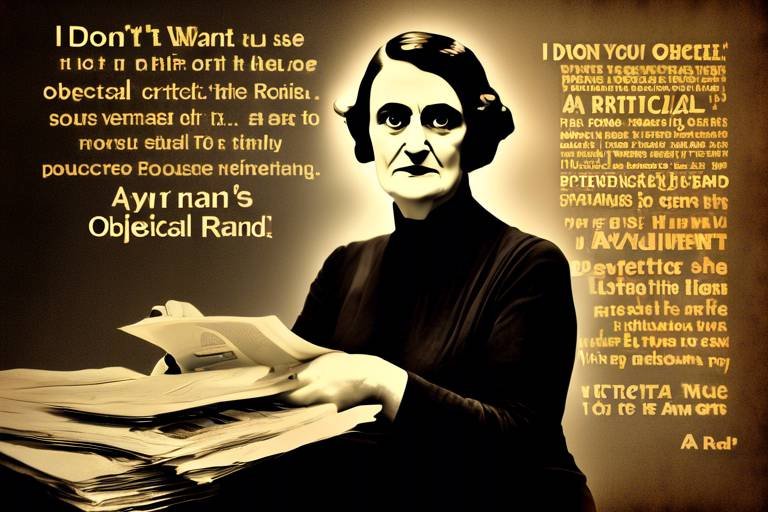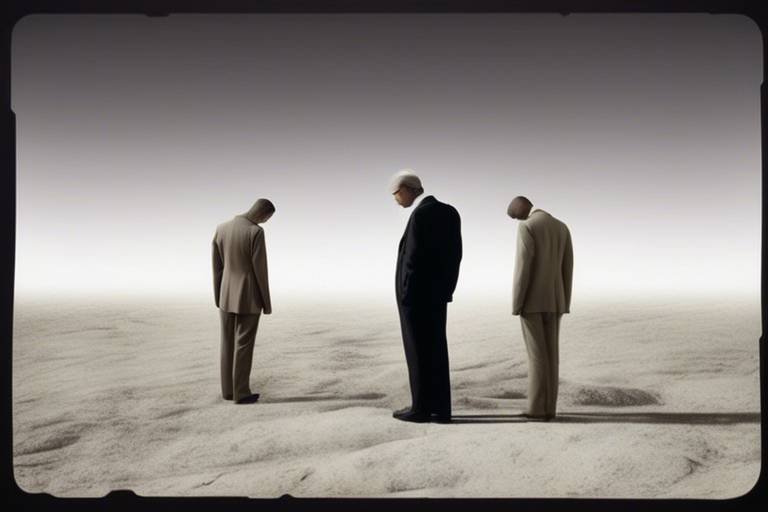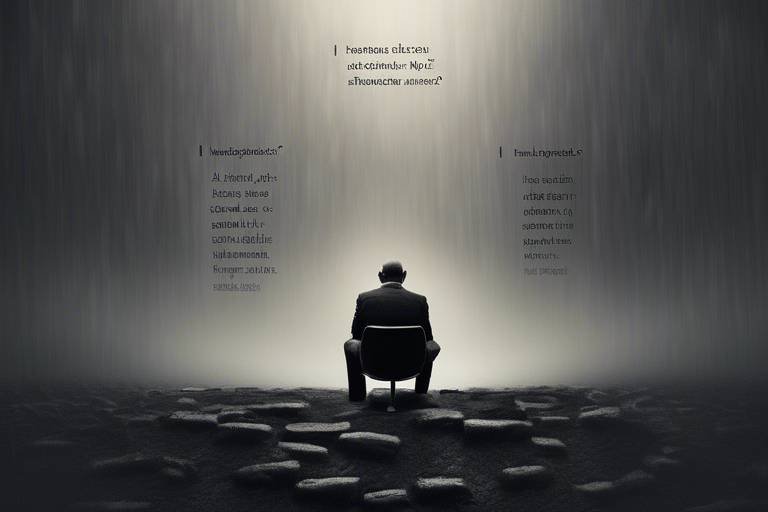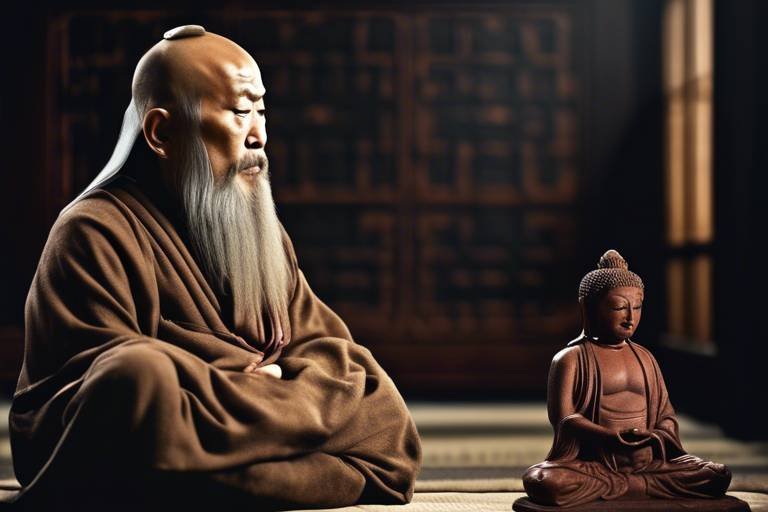The Question of Universal Ethics - An Investigation
This article explores the concept of universal ethics, examining its foundations, implications, and challenges in a diverse world. We will delve into various perspectives and their significance in contemporary moral discourse.
Understanding what constitutes universal ethics is crucial. At its core, universal ethics refers to moral principles that are believed to apply to all individuals, regardless of culture, race, or religion. Imagine a global moral compass that points to a common understanding of right and wrong. This concept is not just a lofty ideal; it serves as a foundation for international laws and human rights. In a world that is increasingly interconnected, having a shared ethical framework can help bridge divides and foster mutual respect among diverse cultures.
Universal ethics is often contrasted with cultural relativism, which suggests that moral values are shaped by cultural contexts. While cultural relativism has its merits, especially in appreciating the richness of different traditions, it raises questions: Can we truly accept that all cultural practices are equally valid? Or is there a need for a universal standard to protect basic human dignity? These questions form the crux of ongoing debates in moral philosophy.
Examining the historical evolution of ethical thought reveals how various philosophers and movements have shaped the discourse on universal ethics. From ancient wisdom to modern theories, the journey of ethical thought is rich and complex. Think of it as a tapestry woven with threads of different ideas, each contributing to our current understanding of morality. Key figures like Aristotle, Kant, and Mill have all played pivotal roles in this development, providing insights that continue to resonate today.
Ancient philosophies, such as Stoicism and Confucianism, laid the groundwork for universal ethics. Stoicism, with its emphasis on virtue and rationality, advocated for a set of moral principles that transcend individual circumstances. It teaches that by cultivating inner strength and wisdom, individuals can align with universal truths. On the other hand, Confucianism focuses on relationships and social harmony, emphasizing the importance of community and ethical interactions among individuals. Together, these philosophies illustrate the early attempts to formulate a universal ethical framework.
Stoicism emphasized virtue and rationality, advocating for universal moral principles. The Stoics believed that by adhering to reason and virtue, individuals could achieve a state of tranquility, regardless of external circumstances. This idea resonates today, as many people seek ethical guidelines that promote personal and collective well-being. Stoic thought contributes to contemporary understandings of ethics by encouraging individuals to act with integrity and to consider the broader implications of their actions on society.
Confucianism, on the other hand, focuses on the importance of relationships and social harmony. It teaches that ethical behavior is rooted in the context of familial and societal relationships. This perspective is particularly relevant in collectivist societies, where the emphasis is placed on the community over the individual. Confucian ethics encourages individuals to act in ways that promote harmony and respect within their social circles, thus contributing to a broader understanding of universal ethics.
In today's world, modern ethical theories such as utilitarianism and deontology continue to shape our understanding of universal moral standards. Utilitarianism posits that the best action is the one that maximizes overall happiness, suggesting a quantifiable approach to ethics. Meanwhile, deontology, championed by philosophers like Immanuel Kant, argues that actions must adhere to a set of rules or duties, irrespective of the consequences. These theories provide frameworks that strive to establish universal principles, yet they also encounter challenges in a pluralistic world where diverse beliefs coexist.
Despite its appeal, universal ethics faces significant challenges. Cultural relativism, moral disagreements, and the implications of diversity all complicate the pursuit of universally accepted ethical standards. For instance, what happens when two cultures have conflicting moral beliefs? This is where the debate gets heated. Some argue that cultural relativism undermines the possibility of universal ethics, while others believe that a dialogue between cultures can lead to a more enriched understanding of morality.
Cultural relativism argues that moral values are culture-specific, suggesting that one culture's ethics cannot be applied to another. This perspective raises important critiques: if we accept cultural relativism, do we risk endorsing practices that violate human rights? This dilemma highlights the complexity of establishing universal ethics in a world rich with cultural diversity.
Globalization has intensified ethical discussions across cultures, creating a melting pot of ideas and beliefs. As people from different backgrounds interact more than ever, the need for a cohesive ethical framework becomes increasingly apparent. This interconnectedness influences the development and acceptance of universal ethics, prompting us to reconsider our moral positions and embrace a more inclusive dialogue.
- What is universal ethics? Universal ethics refers to moral principles that apply to all individuals, regardless of culture or background.
- How do ancient philosophies contribute to modern ethics? Ancient philosophies like Stoicism and Confucianism provide foundational ideas that influence contemporary ethical frameworks.
- What are the challenges to universal ethics? Challenges include cultural relativism, moral disagreements, and the complexities introduced by globalization.

Defining Universal Ethics
Understanding what constitutes universal ethics is crucial in our increasingly interconnected world. At its core, universal ethics seeks to establish a set of moral principles that transcend cultural, social, and individual differences. Imagine a moral compass that points true north, regardless of where you are on the globe; this is the essence of universal ethics. It aims to provide guidelines that can be universally applied, fostering a sense of common humanity and shared responsibility.
Universal ethics is not just about creating a one-size-fits-all approach to morality; rather, it acknowledges the diversity of human experiences while striving for common ground. This can involve principles such as justice, fairness, and compassion, which resonate across various cultures. For instance, the idea that every human being deserves respect and dignity is a fundamental tenet that many ethical systems embrace, regardless of their origins. But how do we define these principles in a way that is both inclusive and effective?
To better understand universal ethics, we can break it down into several key components:
- Human Rights: The belief that certain rights are inherent to all individuals, regardless of nationality, culture, or religion.
- Common Good: The idea that ethical decisions should benefit society as a whole, not just individual interests.
- Empathy: Understanding and sharing the feelings of others, which fosters a sense of community and interconnectedness.
These components serve as a foundation for building a universal ethical framework. However, the challenge lies in implementing these principles in a way that respects cultural differences while promoting a cohesive moral outlook. It's like trying to create a beautiful tapestry; each thread represents a unique culture, yet together they weave a larger narrative of humanity. This balancing act is essential in fostering dialogue and understanding among diverse groups.
Furthermore, universal ethics must be adaptable. As our world evolves, so do our understandings of morality. New issues arise, such as environmental concerns and technological advancements, which require us to rethink and sometimes revise our ethical standards. The dynamic nature of universal ethics means that it is not static; rather, it is a living, breathing entity that grows with society. This adaptability is what makes it relevant in contemporary moral discourse.
In summary, defining universal ethics involves recognizing the shared values that unite us as human beings while respecting the rich tapestry of cultural differences. As we navigate the complexities of a globalized world, the pursuit of universal ethics becomes not just an academic endeavor but a practical necessity. It challenges us to think critically about our moral beliefs and encourages us to engage in meaningful conversations that can bridge divides and foster understanding.
What is universal ethics?
Universal ethics refers to a set of moral principles that are believed to apply to all human beings, regardless of cultural, social, or individual differences.
Why is universal ethics important?
It promotes a sense of common humanity and shared responsibility, helping to create a more just and equitable world.
Can universal ethics coexist with cultural relativism?
Yes, while universal ethics aims for common principles, it can respect and acknowledge cultural differences, fostering dialogue and understanding.

The Historical Context
To truly grasp the essence of universal ethics, we must embark on a journey through time, exploring the rich tapestry of philosophical thought that has shaped our understanding of morality. The historical context of universal ethics is not just a backdrop; it is a vibrant canvas painted with the ideas of remarkable thinkers and movements that have influenced ethical discourse across centuries. From the ancient philosophers who laid the groundwork to the modern theorists who grapple with complex moral dilemmas, each era contributes unique insights that resonate even today.
In the ancient world, ethical considerations were often intertwined with metaphysical beliefs and societal norms. Philosophers like Plato and Aristotle began to explore the nature of virtue and the good life, laying a foundation for ethical inquiry. Their ideas prompted future generations to question whether there could be universal moral truths applicable to all human beings, regardless of their cultural or situational contexts. This quest for a common ethical ground can be seen as an early form of universal ethics.
Among the ancient philosophies, Stoicism and Confucianism stand out as pivotal influences. Stoicism, with its emphasis on virtue and rationality, proposed that certain moral principles are inherent in human nature and can guide individuals toward a life of virtue. The Stoics believed that by cultivating inner peace and aligning one's actions with reason, individuals could achieve a universal standard of ethics that transcends cultural boundaries. Their teachings encouraged followers to view themselves as part of a larger community, promoting a sense of shared humanity.
On the other hand, Confucianism offered a different perspective, focusing on relationships and social harmony. Confucius argued that ethical behavior stems from our interactions with others and the importance of fulfilling our roles within society. This relational approach highlights the significance of context in ethical considerations, suggesting that while there may be universal principles, their application can vary based on cultural norms. The interplay between individual morality and societal expectations remains a crucial aspect of contemporary discussions on universal ethics.
Stoicism's impact on modern ethical thought cannot be overstated. The Stoics posited that virtue is the highest good and that individuals should strive for moral integrity, regardless of external circumstances. This notion resonates strongly in today's world, where ethical dilemmas often arise in complex and challenging environments. By advocating for a universal moral compass grounded in reason and virtue, Stoicism provides a framework that encourages individuals to act ethically, even when faced with adversity.
Confucianism, with its emphasis on community and social responsibility, offers valuable insights into the importance of context in ethical decision-making. In collectivist societies, where relationships and harmony are paramount, Confucian principles can guide individuals toward actions that promote the common good. The idea that ethics are not solely individualistic but are deeply rooted in social interactions challenges the notion of a one-size-fits-all approach to morality. This perspective is particularly relevant in our increasingly globalized world, where diverse cultures interact and negotiate ethical standards.
As we move forward in our exploration of universal ethics, it is essential to recognize that the historical context provides a rich foundation for contemporary debates. The ideas of ancient philosophers continue to echo in modern ethical discussions, reminding us that the quest for a universal moral framework is not merely an academic exercise but a vital pursuit that shapes our understanding of what it means to be human.
- What is universal ethics? Universal ethics refers to moral principles that are considered to be applicable to all individuals, regardless of culture or context.
- How did ancient philosophies influence modern ethics? Ancient philosophies like Stoicism and Confucianism laid the groundwork for discussions on universal moral principles, emphasizing virtue, rationality, and social harmony.
- What challenges does universal ethics face today? Universal ethics faces challenges from cultural relativism, moral disagreements, and the complexities introduced by globalization.

Ancient Philosophical Roots
When we talk about the foundations of universal ethics, we can’t overlook the profound influence of ancient philosophies. Two of the most significant schools of thought that have shaped our understanding of ethics are Stoicism and Confucianism. These ancient traditions not only laid the groundwork for ethical discussions but also provided frameworks that resonate even in today’s complex moral landscape.
Stoicism, which emerged in ancient Greece, emphasized the importance of virtue and rationality. The Stoics believed that true happiness comes from living in accordance with nature and reason. They proposed that universal moral principles exist and are accessible through human rationality. This idea is beautifully encapsulated in the Stoic mantra: "Virtue is the only good." By advocating for a universal code of conduct based on reason, Stoicism encourages individuals to rise above personal desires and societal pressures, promoting a sense of moral duty that transcends cultural boundaries.
On the other hand, Confucianism offers a different yet complementary perspective. Originating in China, Confucianism emphasizes the importance of relationships and social harmony. Its core tenets revolve around the concepts of ren (benevolence) and li (proper conduct), which stress the significance of interpersonal connections and moral integrity. Confucian ethics advocate for a form of universalism that is rooted in the idea that ethical behavior is essential for societal well-being. This approach highlights how the well-being of individuals is intricately tied to the health of their communities, making it particularly relevant in collectivist societies.
Both Stoicism and Confucianism contribute to our understanding of universal ethics in distinct ways. Stoicism provides a framework for individual moral responsibility, while Confucianism emphasizes the importance of community and relational ethics. Together, they illustrate that the quest for universal ethical principles is not merely an abstract philosophical exercise; it is a deeply practical endeavor that can guide our actions in a diverse world.
To summarize, the ancient philosophical roots of universal ethics remind us that while our cultures and societies may differ, the core values of virtue, reason, and relational harmony can unite us in our moral pursuits. These foundational ideas continue to inspire contemporary ethical discussions and challenge us to consider how we can foster a more harmonious global society.
- What is universal ethics? Universal ethics refers to the idea that certain moral principles apply to all individuals, regardless of culture or personal beliefs.
- How do ancient philosophies influence modern ethics? Ancient philosophies like Stoicism and Confucianism provide foundational ideas that continue to shape contemporary ethical frameworks and discussions.
- What are the challenges to universal ethics? Challenges include cultural relativism, moral disagreements, and the complexities introduced by globalization.

Stoicism and Its Influence
Stoicism, a philosophical school that emerged in ancient Greece, has had a profound impact on the development of ethical thought, particularly in the realm of universal ethics. At its core, Stoicism teaches that virtue, defined as the highest good, is based on knowledge and that the wise live in harmony with the divine Reason (or Logos) that governs nature. This perspective emphasizes the importance of rationality, self-control, and the acceptance of things we cannot change, which resonates with many contemporary ethical frameworks.
One of the most compelling aspects of Stoicism is its advocacy for universal moral principles. Stoic philosophers like Epictetus and Marcus Aurelius argued that all human beings share a common rationality, which suggests that ethical truths are not merely subjective or culturally bound but are instead universally applicable. This idea can be likened to the notion of a moral compass that points true north, guiding individuals toward right conduct regardless of their cultural background.
Moreover, Stoicism teaches that our emotions should not dictate our actions. By practicing apatheia (freedom from passion), Stoics believe individuals can achieve a state of inner peace and make ethical decisions based on reason rather than fleeting feelings. This rational approach to ethics is particularly significant in today’s world, where emotional responses often overshadow logical reasoning in moral debates.
Another critical contribution of Stoicism is its emphasis on the interconnectedness of humanity. Stoics viewed all people as part of a larger community, which fosters a sense of responsibility toward others. This idea aligns with the modern concept of global citizenship, where individuals recognize their ethical obligations not just to their immediate community but to the world at large. In this way, Stoicism provides a robust framework for understanding universal ethics in a diverse and interconnected world.
To summarize, the influence of Stoicism on universal ethics can be encapsulated in the following key points:
- Universal Moral Principles: Stoicism posits that ethical truths are applicable to all humans, transcending cultural boundaries.
- Rational Decision-Making: The Stoic practice of using reason over emotion promotes thoughtful ethical considerations.
- Interconnectedness: Stoicism emphasizes our shared humanity, urging us to act with compassion and responsibility toward others.
In conclusion, Stoicism not only provides a rich historical context for understanding universal ethics but also offers practical guidance for navigating the moral complexities of modern life. Its teachings encourage us to rise above cultural differences and embrace a more unified ethical perspective, making it a vital part of contemporary moral discourse.
What is Stoicism?
Stoicism is an ancient Greek philosophy that teaches the development of self-control and fortitude as a means of overcoming destructive emotions. It emphasizes rationality and virtue as the path to a good life.
How does Stoicism relate to universal ethics?
Stoicism advocates for universal moral principles that apply to all humans, suggesting that ethical truths transcend cultural differences and are rooted in our shared rationality.
Can Stoicism help in modern ethical dilemmas?
Yes! Stoicism encourages rational decision-making and emotional resilience, which can help individuals navigate complex ethical situations with clarity and integrity.

Confucianism's Ethical Contributions
Confucianism, originating from the teachings of Confucius in ancient China, has made significant contributions to the understanding of ethics, particularly in relation to social harmony and interpersonal relationships. At its core, Confucianism emphasizes the importance of ren (benevolence or humaneness) and li (ritual propriety), which together create a framework for moral conduct that prioritizes community and familial ties over individualism. This ethical approach is particularly relevant in collectivist societies, where the well-being of the group often takes precedence over personal desires.
One of the most compelling aspects of Confucian ethics is the idea of the Five Relationships, which serves as a guideline for social interaction. These relationships are:
- Ruler to ruled
- Father to son
- Husband to wife
- Older brother to younger brother
- Friend to friend
Each of these relationships is anchored in mutual respect and responsibility, creating a web of interconnected duties that fosters social cohesion. For instance, the ruler is expected to be just and benevolent, while the ruled should exhibit loyalty and respect. This reciprocal nature of relationships is crucial in understanding how Confucianism advocates for a balanced society.
Moreover, Confucianism introduces the concept of filial piety, which stresses the importance of respecting and honoring one's parents and ancestors. This principle not only reinforces family bonds but also establishes a sense of continuity and respect for tradition. In a world that often seems to prioritize the new and innovative, Confucianism reminds us of the value of looking back and learning from our predecessors. It cultivates a sense of responsibility towards one's family and community, which can be seen as a precursor to modern discussions about social responsibility and ethical leadership.
In contemporary ethical discourse, Confucianism's emphasis on relational ethics can offer valuable insights. As we navigate a globalized world filled with diverse cultures and perspectives, the Confucian approach encourages dialogue and understanding rather than conflict. By recognizing the interconnectedness of our actions and the impact they have on others, we can foster a more inclusive and empathetic ethical framework. This is particularly relevant in discussions about global issues such as climate change, where collective action is essential for meaningful progress.
In summary, Confucianism's contributions to ethics extend beyond mere philosophical discourse; they provide a practical guide for navigating the complexities of human relationships. By prioritizing social harmony, respect for tradition, and mutual responsibility, Confucianism offers a robust framework that can help bridge cultural divides and promote universal ethical principles in an increasingly interconnected world.

Modern Ethical Theories
When we dive into the realm of , we find ourselves navigating a complex landscape where differing views and principles collide. These theories are not just academic musings; they shape our everyday decisions and societal norms. Two of the most prominent schools of thought in this arena are utilitarianism and deontology. Each offers a unique lens through which we can evaluate moral actions, and understanding their nuances is crucial for grasping the broader conversation around universal ethics.
Utilitarianism, often summarized by the phrase "the greatest good for the greatest number," is a consequentialist theory that evaluates the morality of an action based on its outcomes. The idea is simple: if an action produces more happiness than suffering, it is deemed ethical. This theory, championed by philosophers like Jeremy Bentham and John Stuart Mill, encourages us to think about the collective impact of our actions. Imagine a scenario where a community must decide whether to build a new park. If the park benefits a majority of residents by providing a space for recreation and relaxation, utilitarianism would advocate for its construction, even if it means a small inconvenience for a few.
On the other hand, we have deontology, which posits that the morality of an action is based on whether it adheres to a set of rules or duties, regardless of the consequences. This theory, largely associated with Immanuel Kant, emphasizes the importance of intentions and the inherent value of individuals. For a deontologist, telling the truth is a moral obligation, even if that truth could lead to negative outcomes. Picture a situation where a friend asks you if they look good in an outfit that you secretly think is unflattering. A deontologist would argue that honesty is paramount, and you should express your true opinion, even if it might hurt their feelings. This approach highlights a key tension in ethical discussions: is it better to prioritize rules or outcomes?
Both of these theories have their strengths and weaknesses. Utilitarianism can sometimes overlook individual rights in the pursuit of the greater good, leading to potential abuses. For instance, if the happiness of the majority comes at the expense of a minority's well-being, is that truly ethical? Conversely, deontology can seem rigid and impractical, as strict adherence to rules may lead to outcomes that appear morally questionable. For example, if a deontologist refuses to lie to protect someone from harm, they may inadvertently allow a harmful situation to unfold.
The interplay between these modern ethical theories illustrates the ongoing struggle to define universal ethics in our diverse world. As we engage with these ideas, it becomes evident that no single theory can provide all the answers. Instead, they invite us to critically assess our moral frameworks and consider how they apply in various contexts. In a world where cultures intersect and values clash, finding common ground is essential for fostering mutual understanding and respect.
As we reflect on the implications of these modern theories, it’s essential to recognize that ethical discussions are not merely academic; they have real-world consequences. The decisions we make, influenced by these frameworks, shape our societies and impact lives. Therefore, engaging with these ideas not only enriches our understanding of ethics but also empowers us to navigate the moral complexities of our interconnected world.
- What is the main difference between utilitarianism and deontology? Utilitarianism focuses on the outcomes of actions, while deontology emphasizes adherence to rules and duties.
- Can one ethical theory be considered superior to another? It depends on the context and the specific moral dilemmas being faced; each theory has its strengths and weaknesses.
- How do modern ethical theories apply to real-life situations? They provide frameworks for evaluating decisions and actions, helping individuals and societies navigate moral challenges.

Challenges to Universal Ethics
The pursuit of universal ethics is akin to navigating a labyrinth filled with twists and turns, where each corner reveals a new challenge. Despite its noble aspirations, universal ethics faces significant hurdles that can complicate its acceptance and application across diverse cultures. One of the most prominent challenges is cultural relativism, which posits that moral values are not universal but rather specific to individual cultures. This perspective raises a crucial question: if ethics vary so widely from one society to another, can we truly claim that there are universal moral principles that everyone should adhere to?
Cultural relativism argues that what is considered morally right in one culture may be seen as wrong in another. For example, practices such as arranged marriages or certain dietary restrictions are viewed differently around the globe. In some cultures, these practices are celebrated as traditions that uphold family values, while in others, they may be criticized as oppressive. This divergence complicates the establishment of a universal ethical framework, as it challenges the notion that there is a single moral truth applicable to all human beings.
Moreover, the rise of globalization has further intensified these ethical discussions. As cultures become increasingly interconnected, the clash of values and beliefs often leads to moral disagreements. The dialogue surrounding universal ethics must grapple with the reality that while we are more connected than ever, we also face a mosaic of ethical perspectives that can conflict dramatically. This interconnectedness can be both a blessing and a curse; it fosters understanding but also highlights profound differences in moral reasoning.
Another significant challenge is the implications of diversity on ethical standards. In a world where individuals identify with multiple cultural backgrounds, the question arises: how do we reconcile these diverse influences to form a cohesive ethical stance? For instance, someone raised in a collectivist culture may prioritize community welfare over individual rights, while a person from an individualistic society might champion personal freedom above all else. This divergence can lead to ethical dilemmas that are difficult to navigate.
To illustrate these challenges, consider the following table that highlights the differences between cultural relativism and universal ethics:
| Aspect | Cultural Relativism | Universal Ethics |
|---|---|---|
| Definition | Moral values are culture-specific | There are universal moral principles applicable to all |
| Perspective | Ethics vary between societies | Ethics transcend cultural boundaries |
| Example | Arranged marriages | Human rights violations |
| Implication | Challenges the notion of a single moral truth | Seeks common ground for ethical standards |
In conclusion, while the idea of universal ethics is appealing, it is essential to recognize and address these challenges. The complexities of cultural relativism, the impact of globalization, and the implications of diversity all play significant roles in shaping our understanding of morality. As we continue to engage in discussions about ethics in this diverse world, we must remain open to the idea that while we may strive for universal principles, the path to achieving them is fraught with challenges that require careful consideration and dialogue.
- What is cultural relativism? Cultural relativism is the belief that moral values are not universal but are instead specific to individual cultures.
- How does globalization affect ethical discussions? Globalization increases interactions between cultures, which can lead to both greater understanding and significant moral disagreements.
- Can universal ethics coexist with cultural diversity? While it is challenging, it is possible to seek common ethical principles while respecting cultural differences.
- What are some examples of moral disagreements? Examples include differing views on practices like arranged marriages, euthanasia, and freedom of speech.

Cultural Relativism
Cultural relativism is a concept that stirs the waters of ethical discourse, challenging the very foundations of universal ethics. At its core, cultural relativism posits that moral values and ethical standards are not absolute but rather are shaped by cultural contexts. This perspective suggests that what is deemed right or wrong can vary significantly from one culture to another, leading to a rich tapestry of moral beliefs across the globe. But does this mean that universal ethics is a futile pursuit? Let's dive deeper.
To illustrate, consider this analogy: Imagine a vast buffet where each dish represents a different culture’s ethical viewpoint. Just as diners choose dishes based on their preferences and backgrounds, societies adopt moral codes that resonate with their unique experiences and histories. This buffet of ethics is both diverse and complex, making it difficult to establish a single, universal standard that applies to all.
Critics of cultural relativism argue that while it acknowledges diversity, it can also lead to moral paralysis. If every cultural practice is deemed equally valid, how do we address practices that may violate fundamental human rights? For instance, practices such as female genital mutilation or child marriage are defended by some cultures as traditions, yet they raise significant ethical concerns on a global scale. This tension between respecting cultural practices and advocating for universal human rights creates a moral quagmire.
Moreover, cultural relativism can lead to an "us vs. them" mentality, where outsiders may feel justified in dismissing or critiquing another culture's practices without fully understanding their context. This can foster a sense of superiority and alienation, undermining the very idea of global ethical dialogue. To combat this, a more nuanced approach is necessary—one that embraces cultural diversity while also recognizing the need for certain universal principles.
In the quest for universal ethics, it's essential to strike a balance between respecting cultural differences and advocating for shared human values. A potential solution lies in the concept of "ethical pluralism," which acknowledges that while there may be multiple valid ethical perspectives, some core values—such as justice, equality, and respect for human dignity—should be upheld universally. This approach encourages dialogue and understanding, allowing for a more cohesive ethical framework in an increasingly interconnected world.
In summary, cultural relativism offers valuable insights into the complexity of moral beliefs across cultures but also presents significant challenges for the establishment of universal ethics. As we navigate this intricate landscape, the goal should be to foster a global ethical discourse that respects cultural diversity while promoting fundamental human rights. After all, in our shared humanity, there lies the potential for a common ethical ground.
- What is cultural relativism? Cultural relativism is the idea that moral values are shaped by cultural contexts and therefore vary from one culture to another.
- How does cultural relativism challenge universal ethics? It suggests that there are no absolute moral truths, complicating the establishment of universal ethical standards.
- Can universal ethics coexist with cultural relativism? Yes, by finding a balance between respecting cultural diversity and upholding core human values, ethical pluralism can create a framework for coexistence.

Globalization and Ethical Discourse
In today's world, the phenomenon of globalization has become a double-edged sword, particularly when it comes to ethical discourse. On one hand, it facilitates the exchange of ideas, cultures, and values across borders, while on the other, it raises complex questions about the universality of ethics. As we traverse this interconnected world, we must ask ourselves: can there truly be universal ethical standards when cultures are so diverse?
Globalization has ushered in an era where communication and interaction among different cultures occur at an unprecedented rate. This interconnectedness allows for a rich tapestry of ideas to emerge, paving the way for a more comprehensive understanding of ethics. For instance, consider how social media platforms enable conversations about human rights, environmental issues, and economic justice that transcend national boundaries. These platforms serve as modern-day agorae, where people from various backgrounds can share their perspectives and challenge existing norms.
However, this blending of ideas also leads to a clash of values. What one culture may see as a moral imperative, another might view as an infringement on their traditions. This raises the question: how do we reconcile these differences? The answer isn't straightforward. It requires a careful balancing act between respecting cultural particularities and striving for a common ethical ground. For example, while some cultures prioritize individual rights, others may emphasize community welfare. This divergence complicates the establishment of universal ethical principles.
Moreover, the influence of globalization on ethical discourse can be observed in various sectors, including business, healthcare, and environmental policy. Companies operating on a global scale often face dilemmas regarding labor practices, environmental sustainability, and corporate governance. The challenge lies in navigating these ethical waters without imposing one cultural perspective over another. To illustrate this, let’s take a look at how different regions approach corporate social responsibility (CSR):
| Region | CSR Focus | Common Practices |
|---|---|---|
| North America | Individual Rights | Transparency, Fair Labor Practices |
| Europe | Social Welfare | Environmental Sustainability, Community Engagement |
| Asia | Collectivism | Family and Community Support, Long-term Relationships |
This table illustrates how different regions prioritize various aspects of CSR, reflecting their unique cultural values. As globalization continues to shape our world, the challenge remains: how do we foster an ethical discourse that respects these differences while promoting a sense of shared responsibility?
In conclusion, the interplay between globalization and ethical discourse is intricate and multifaceted. As we navigate this landscape, it’s vital to engage in open dialogue and cultivate an understanding of diverse perspectives. Only then can we hope to establish a framework of universal ethics that honors cultural diversity while promoting global harmony.
- What is globalization? Globalization refers to the process of increased interconnectedness and interdependence among countries, often driven by trade, technology, and cultural exchange.
- How does globalization affect ethical standards? Globalization can lead to both the sharing of ethical ideas and the clash of differing cultural values, complicating the establishment of universal ethical standards.
- What role does culture play in ethics? Culture significantly influences ethical beliefs and practices, leading to variations in how moral issues are perceived and addressed across different societies.
- Can there be universal ethics? While the idea of universal ethics is appealing, the reality is that cultural differences often challenge the establishment of universally accepted moral principles.
Frequently Asked Questions
- What is universal ethics?
Universal ethics refers to moral principles that are believed to apply to all individuals, regardless of culture, race, or religion. It's the idea that there are some ethical standards that transcend local customs and can be universally accepted.
- Why is universal ethics important in today's world?
In a globalized society, understanding and applying universal ethics can foster better communication and cooperation among diverse cultures. It helps in addressing global issues like human rights, environmental concerns, and social justice by providing a common ethical framework.
- How do ancient philosophies contribute to universal ethics?
Ancient philosophies, such as Stoicism and Confucianism, laid the groundwork for universal ethics by emphasizing virtues like rationality, social harmony, and moral integrity. Their teachings continue to influence contemporary ethical discussions, providing timeless insights into human behavior and relationships.
- What challenges does universal ethics face?
Universal ethics encounters challenges such as cultural relativism, which suggests that moral values are specific to individual cultures. This perspective can complicate the establishment of universally accepted ethical standards, leading to moral disagreements and conflicts.
- How does globalization impact ethical discourse?
Globalization has intensified ethical discussions by bringing diverse cultures into closer contact. This interconnectedness promotes the exchange of ideas and values, which can either strengthen the case for universal ethics or highlight the complexities of differing moral perspectives.
- Can universal ethics coexist with cultural relativism?
Yes, while universal ethics advocates for common moral principles, it can coexist with cultural relativism by recognizing that local customs and values also play a significant role in shaping ethical beliefs. The challenge lies in finding a balance between respecting cultural diversity and upholding universal moral standards.
- What role do modern ethical theories play in universal ethics?
Modern ethical theories like utilitarianism and deontology contribute to the discourse on universal ethics by providing structured approaches to moral reasoning. They help clarify how universal principles can be applied in practical situations, addressing the complexities arising from a pluralistic world.



















